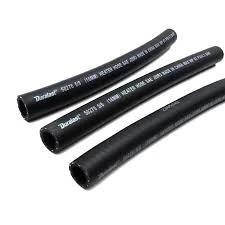Understanding Low Pressure Power Steering Hose and Its Importance in Vehicle Performance
Nov . 01, 2024 08:11 Back to list
Understanding Low Pressure Power Steering Hose and Its Importance in Vehicle Performance
Understanding Low Pressure Power Steering Hoses Importance and Maintenance
Power steering systems have become an essential component in modern vehicles, providing drivers with the ease and comfort of maneuvering their cars. At the heart of this system lies the power steering hose, specifically the low-pressure power steering hose. This article will delve into the importance of low-pressure power steering hoses, their functions, signs of wear, and tips for maintenance.
Understanding Low Pressure Power Steering Hoses Importance and Maintenance
One of the most critical aspects of low-pressure power steering hoses is their construction. Typically made from durable rubber or reinforced synthetic materials, these hoses are engineered to resist wear and tear from constant fluid flow and varying temperature conditions. However, over time and due to environmental factors, these hoses can degrade. Signs of wear may include cracks, leaks, or swelling, which can compromise the entire steering system's effectiveness.
low pressure power steering hose

Regular maintenance and inspection of low-pressure power steering hoses are crucial to prevent potential breakdowns and the need for costly repairs. Drivers should routinely check for any visible signs of damage and ensure that connections are secure. It is also advisable to inspect the power steering fluid itself, as discolored or contaminated fluid can indicate a problem within the system, often linked to hose issues.
If a low-pressure hose is found to be damaged, it is essential to replace it promptly. Operating a vehicle with a compromised power steering system can lead to more severe issues, including complete steering failure, which poses significant safety risks on the road. Replacement hoses should match the manufacturer's specifications to ensure compatibility and reliability, so consulting a professional or referring to the vehicle's service manual is recommended.
In conclusion, low-pressure power steering hoses are integral to the overall performance and safety of a vehicle's steering system. Understanding their function, recognizing signs of wear, and committing to regular maintenance can significantly enhance a vehicle's longevity and reliability. By staying proactive with these components, drivers can ensure a smoother, safer driving experience, minimizing the risk of unexpected steering failures. Investing time in the care of low-pressure power steering hoses ultimately pays off in terms of vehicle safety and performance.
